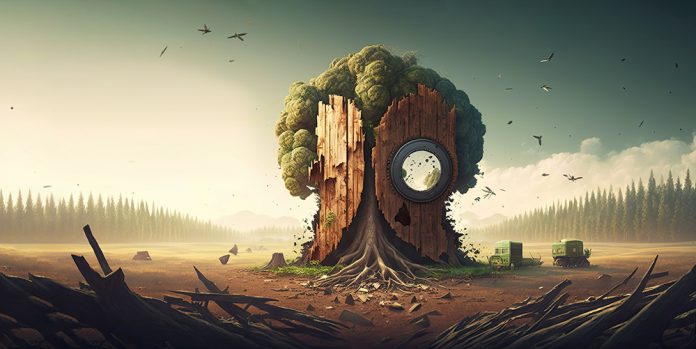Tobias Grabler, chief operating officer, Topo, explains the impact of this major new law on both EU and UK business, and how technology can help support a smoother transition for supply chains.
The European Union (EU) has recently adopted a new regulation to prevent the import and export of products that are linked to deforestation and forest degradation.
The regulation, which came into force on 29 June 2023, will require companies to conduct due diligence on their supply chain to ensure their products comply with the environmental and social standards of the countries of origin.
This includes UK firms trading in relevant sectors within the bloc; they are now required to comply with the same level of due diligence as their EU partners if these trade partnerships are to continue, for example, by conducting thorough supplier and client audits.
The regulation covers a range of commodities and products such as palm oil, cattle, soy, coffee, cocoa, timber, and rubber as well as derived products such as beef, furniture, or chocolates. This regulation also aims to ensure that a set of key goods exported or placed on the EU market must be “deforestation-free,” meaning they were produced on land that has not been subject to deforestation or forest degradation since 31 December 2020.
The regulation also requires operators and traders which are not SMEs to collect geographic coordinates (geolocation) of the plots of land where the commodities were produced. This is necessary to demonstrate that there is no deforestation on a specific location.
Imports of furniture, cocoa, palm oil, and coffee
An impact assessment from the European Commission estimated that the new law would protect at least 71,920 hectares (278 sq miles) of forest annually – the equivalent of around 100,000 football pitches and reduce CO2 emissions by 31.9 million metric tons per year.
The EU is a major importer of various commodities and products that are linked to deforestation and forest degradation, such as furniture, coffee, palm oil, cocoa, and timber to name some. According to various reports:
Furniture – The EU is the second largest importer of furniture in the world, after the United States. In 2021, the United States was the leading importer of furniture from the rest of the world, with an import value of around 67.7 billion U.S. dollars
Cocoa – The EU is also the world’s largest importer of cocoa, accounting for 60% of world imports. Europe’s total imports of cocoa beans amounted to over 2.2 million tonnes in 2021.
Palm Oil – In 2020, the EU imported nearly 8.2 million metric tons (MT) of palm oil.
Coffee – The EU imported 2.9 million tonnes of coffee from abroad in 2020, an increase of 7% compared with 2010 levels. Most of the coffee imported in 2020 from non-EU countries arrived from Brazil and Vietnam, at 933,000 and 642,000 tonnes, respectively.
The EU’s deforestation and labour crackdown will be a game-changer for businesses and technology, as it will have significant implications for their production processes, trade relations, innovation opportunities, and sustainability performance.
Five steps for businesses to adapt
Businesses must take action to ensure their supply chains comply with the new regulation – otherwise, they may face sanctions including fines, withdrawal of market access, or criminal liability.
To avoid such penalties, businesses must follow the below steps:
1. Conduct strict due diligence to ensure products meet criteria of being “deforestation-free” and of “legal origin.”
2. Report due diligence outcomes to the competent authorities of EU Member States where the company is established or where products are on the market.
3. Comply with human rights legislation of the country of production, and respect the rights of affected indigenous peoples.
4. Adapt practices and strategies to reflect new rules and consumer demands.
5. Invest in green innovation and technology to improve sustainability.
Opportunities for businesses to enhance sustainability
The regulation also creates opportunities for businesses to enhance their sustainability performance and competitiveness by adopting green innovation and technology. Green innovation is activity that promotes economic development and reduces adverse effects on the environment.
Technology can play a key role in enabling green innovation and facilitating compliance with the regulation. For example, technology can help businesses:
- Monitor and trace their supply chains at origin level.
- Improve their production efficiency and reduce their environmental footprint.
- Develop new products or services that are more eco-friendly.
How technology facilitates enforcement
Technology can help authorities verify and enforce the regulation. For example, technology can help governing bodies to:
- Access and analyse deforestation and forest degradation data.
- Detect and prevent illegal activities or corruption using tools such as smart contracts, and digital identity.
- Engage and empower stakeholders such as consumers, producers, or indigenous peoples.
- Use GPS data to spot traffic patterns and predict the possibility of issues such as deforestation.
- Collect and analyze geolocations of production plots to ensure no deforestation.
- Establish digital systems to fulfil requirements, and to carry out risk assessments and mitigation measures.
- Collaborate and communicate with operators and traders further down the supply chain to gather all information necessary to demonstrate that due diligence was exercised and that no or only a negligible risk was found.
The EU deforestation and labour regulation is a pioneering initiative that aims to protect and restore the world’s forests while promoting sustainable trade and development. It poses challenges, but also opportunities for businesses that need to adapt their practices and strategies to comply with the new rules. Technology can be a powerful ally for businesses, as well as for authorities and civil society, to bring about a greener and fairer future.



